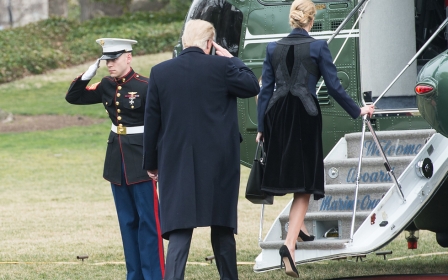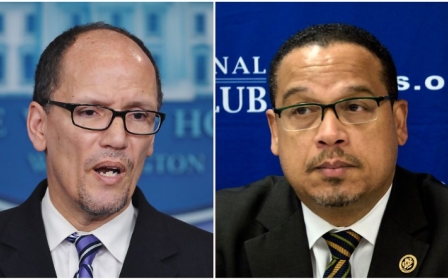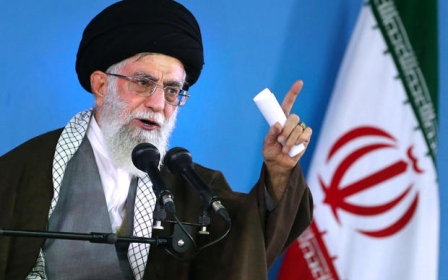Trump plans biggest US military budget increase since Iraq war
US President Donald Trump is seeking what he called a "historic" nine percent increase in military spending, even as the United States has wound down major wars in Iraq and Afghanistan and remains by far the world's strongest military power.
Trump will ask Congress to boost Pentagon spending in the next fiscal year by $54 billion in his first budget proposal and slash the same amount from non-defence spending, including a large reduction in foreign aid, a White House budget official said on Monday.
'The president is surrendering America’s leadership in innovation, education, science and clean energy'
-Nancy Pelosi
The president does not have the final say on federal spending. His plan for the military is part of a budget proposal to Congress, which although is controlled by his fellow Republicans, will not necessarily follow his plans. Budget negotiations with lawmakers can take months to play out.
Trump told state governors at the White House that his budget plan included a "historic increase in defence spending to rebuild the depleted military of the United States of America".
"This is a landmark event and message to the world in these dangerous times, of American strength, security and resolve," he said. "We must ensure that our courageous servicemen and women have the tools they need to deter war and when called upon to fight in our name, only do one thing: win."
Officials familiar with Trump's budget blueprint said the defence increase would be financed partly by cuts to the State Department, Environmental Protection Agency and other non-defence programmes.
“We’re going to do more with less and make the government lean and accountable to the people," Trump said.
The president's budget will not seek cuts in federal social programmes such as Social Security and Medicare, Treasury Secretary Steven Mnuchin said on Sunday.
Unusual spending
Such a military spending hike would be unusual given that the United States is not engaged in a major war, although its Special Forces and Air Force are active against Islamic State (IS) group in Iraq and Syria.
An official familiar with the proposal said Trump's request for the Pentagon included more money for shipbuilding, military aircraft and establishing "a more robust presence in key international waterways and choke points" such as the Strait of Hormuz and South China Sea.
That could put Washington at odds with Iran and China. The United States already has the world's most powerful fighting force and it spends far more than any other country on defence.
Defence spending in the most recent fiscal year was $584 billion, according to the Congressional Budget Office, so Trump's planned $54 billion increase would be a rise of 9.2 percent. About one-sixth of the federal budget goes to military spending.
Mark Cancian, an adviser with the Center for Strategic and International Studies think tank, said Trump's plan was in line with the kind of military spending seen before the Iraq war.
"This is certainly comparable to the largest peacetime buildups, which would be 2003," said Cancian, who worked at the Office of Management and Budget and the Defense Department. He cautioned that the proposal was far from being a budget. "This is just giving everyone the top line."
The "historic" increase, however, was not enough for some Republicans, including Senator John McCain who criticised Trump, arguing that the president’s defence budget is still not enough for the US to secure the peace in a “world on fire”.
'Surrendering leadership'
Nancy Pelosi, the top Democrat in the House of Representatives, said Trump’s plan to slash funding for federal agencies to free up money for the Pentagon showed he was not putting American working families first.
“A $54 billion cut will do far-reaching and long-lasting damage to our ability to meet the needs of the American people and win the jobs of the future,” Pelosi said. “The president is surrendering America’s leadership in innovation, education, science and clean energy."
Other Democrats also blasted Trump’s budget plans.
In a speech to conservative activists on Friday, Trump promised "one of the greatest military build-ups in American history".
But in the same address, he also bemoaned the money spend on foreign wars, including in the Middle East.
“We've spent trillions of dollars overseas, while allowing our own infrastructure to fall into total disrepair and decay. In the Middle East, we've spent as of four weeks ago, $6 trillion. Think of it," Trump said at the the annual Conservative Political Action Conference last week.
The United States spends about $50bn annually on the State Department and foreign assistance.
More than 120 retired US generals and admirals urged Congress on Monday to fully fund US diplomacy and foreign aid, saying that "elevating and strengthening diplomacy and development alongside defence are critical to keeping America safe".
Trump has said previously he would expand the Army to 540,000 active-duty troops from its current 480,000, increase the Marine Corps to 36 battalions from 23 – or as many as 10,000 more Marines – boost the Navy to 350 ships and submarines from 276, and raise the number of Air Force tactical aircraft to 1,200 from 1,100.
He has not said where he would place the extra hardware and forces or made clear what they would be used for. The United States has been shutting some of its military bases in recent years.
Trump has also said he would bolster the development of missile defences and cyber capabilities. Last week, he told Reuters the United States had "fallen behind on nuclear weapon capacity". He pledged to ensure that "we're going to be at the top of the pack".
Trump also said on Monday he would talk about his plans for infrastructure spending in a speech to Congress on Tuesday. "We're going to start spending on infrastructure big," he said.
Plan for IS
Meanwhile, the Pentagon presented the White House with possible new battle plans on Monday to defeat IS, after Trump demanded top brass find additional ways to destroy the militants.
During the election campaign, Trump had claimed to have a secret plan to defeat the militants but never disclosed what it might entail.
He repeatedly pledged to "bomb the hell" out of them and even threatened to kill family members of suspected IS fighters.
Shortly after taking office, the new president gave the Pentagon 30 days to review progress to date and develop a comprehensive plan to "totally obliterate" IS.
'This is not about Syria and Iraq, it's about a trans-regional threat'
- Jeff Davis, Pentagon spokesman
A US-led coalition has been bombing the militants in Iraq and Syria since late summer 2014, while also deploying Western commandos to train and advise local forces.
The initial draft of the review is now complete, and defence secretary Jim Mattis presented the findings to Trump's top national security advisers.
The options outlined in the classified document are preliminary and need to be further refined, said Pentagon spokesman navy captain Jeff Davis.
"It is about the rapid defeat of ISIS," Davis said. "We're going to continue to have a dialogue with our chain of command going forward and developing this plan."
The proposals will likely outline the possibility of sending more US troops to the Middle East and could see the Pentagon taking a more aggressive stance in other key areas.
"This is not about Syria and Iraq, it's about a trans-regional threat," General Joe Dunford, who chairs the Joint Chiefs of Staff, told a Washington audience last week.
"In this particular case, we're talking about ISIS, but it's also al-Qaeda and other groups that present a trans-regional threat."
New MEE newsletter: Jerusalem Dispatch
Sign up to get the latest insights and analysis on Israel-Palestine, alongside Turkey Unpacked and other MEE newsletters
Middle East Eye delivers independent and unrivalled coverage and analysis of the Middle East, North Africa and beyond. To learn more about republishing this content and the associated fees, please fill out this form. More about MEE can be found here.




